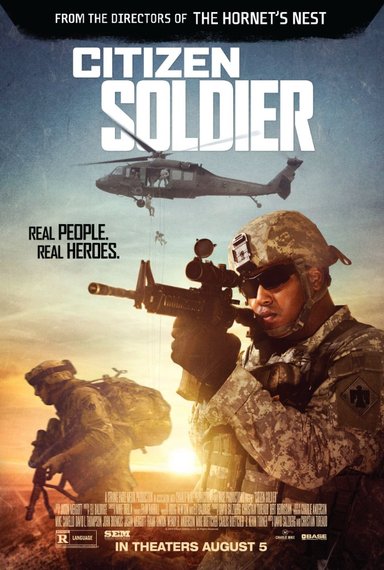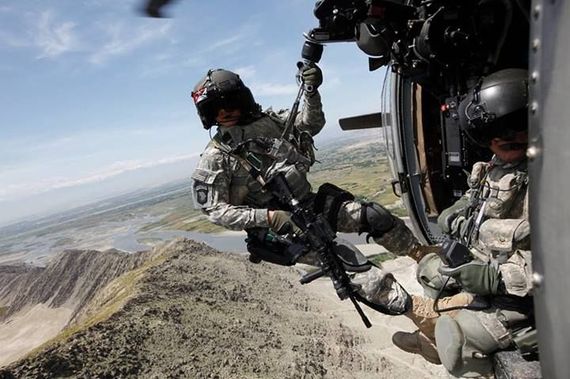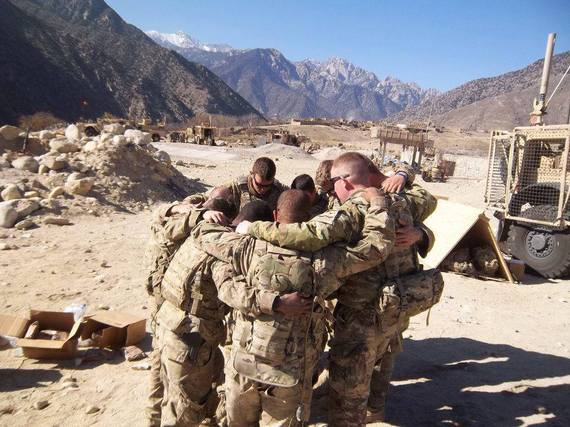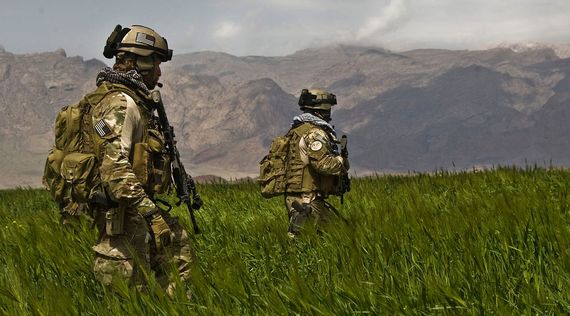Citizen Soldier is a dramatic feature film, told from the point of view of a group of Soldiers in the Oklahoma Army National Guard's 45th Infantry Brigade Combat Team.
SAM: What makes Citizen Soldier a standout from The Hornet's Nest? What's the hook?
CHRISTIAN: So Citizen Soldier was actually shot by the soldiers. They had these GoPros on their helmets and we were able to get footage from the combat photographers. There were two female combat photographers embedded that the army placed and we were able to get the footage from those two females. So we took footage from the soldiers and the combat photographers and we recreated a year long journey of the National Guard. And the National Guard only trains 40 days a year. It's a reserve. They got called up to the front lines of war, like any other military branch leaving their jobs and families behind. They were there for a year, so this movie tells their journey.
SAM: What goes into the clearance that you need to have as a filmmaker who primarily makes military movies? Are there any hoops you had to jump through?
CHRISTIAN: Lots of hoops, for sure. We are fortunate to have The Hornet's Nest as a big success. So we have a great relationship with the military. We got that footage and sent it back, and we did it with a lot of integrity. We had to go through PAO which is the Public Affairs Office that controls all of this stuff. We had to get sign offs and special permissions. We engage the families and we engage the soldiers. The soldiers who were there, helped us make this movie. We kind of get their sign offs along the way. Then we go to the PA office and show them the movie then they tell us whether or not we need to stay away from something.
SAM: So you're set to release August 5th. Will your initial release be nationwide?
CHRISTIAN: Yes, this Friday. It will be limited showings in New York, Los Angeles, Oklahoma City and Wichita, Kansas. The guys, the unit is in the Oklahoma 45th, and we are showing in New York and LA to qualify for awards. The big release is August 30th everywhere in all the big box stores, TV outlets, and hotels.
SAM: The Hornet's Nest and Citizen Soldier are all about the front-line soldier experience. As a company, as Strong Eagle Media, what would you say is your mission statement? What kind of message would you like to convey through your films?
CHRISTIAN: Myself and David Salzberg, we direct the films. Bert Bedrosian is our producing partner. We also have Wendy R. Anderson, the former Deputy Chief of Staff at the U.S. Department of Defense. Strong Eagle doesn't only do military films; this is just a division of our company. We also do scripted feature films, scripted television, and reality television. In terms of the military division our goal is to document this time in our country's history and document the war on terror. We want to tell it through these different unique perspectives. Our first movie was a father and son's perspective with the marines. Citizen Soldier is the National Guard being deployed. The third movie coming out is almost done. It focuses on the only journalist ever to embed with a special ops team for an entire year. Her name is Alex Quade, she was the only woman among a team of twelve special ops men for an entire year. Our fourth movie being developed is about rescue, helicopters, and medical evacuations. These are all from different perspectives within our military.
SAM: It's cool that you're not just making standard "guns blazing" military movies. You're getting all those different perspectives from different lines of work.
CHRISTIAN: Yes, exactly and to go back to the question you asked, our bulls-eye is 30 million Americans. Because there are 30 million Americans when you look at who served, veterans, active duty, and their families. As well as those who like military movies. Even gamers!
SAM: Yes, games like Call of Duty that involve military combat are very popular. You'll tap into a lot of that audience. What's great is you'll satisfy the love of battle sequences among adolescents, while teaching a lesson about what war really looks like.
CHRISTIAN: And that part of it is important because we're disconnected right now. There are the people who serve and understand the wars and then there is a big population of our country that has no idea, no idea that people are fighting right now, dying.
SAM: Vietnam was the first televised war but beforehand people just saw the soldiers go off to war and that was that. Once footage of Vietnam was released, it terrified people and they reacted by protesting. We went from seeing nothing to seeing all of it and today it seems we've regressed to not seeing much on TV anymore, they're just calling it a war on terror despite the fact that most Americans have no idea what that really means.
CHRISTIAN: That's exactly right, that is what we are trying to do, trying to bring this to light.
SAM: There is a desensitization to war, in our minds the servicemen and women are thousands of miles away but in reality, every day we live others are dying for our country. I think that it's something a lot of people would love to see.
CHRISTIAN: And another thing we do is, although we have the footage that is pretty gruesome, we would never show that. We honor them. When there is someone that dies, the KIAs in the movie, we highlight them. There were 6 KIAs in The Hornet's Nest. You got to know them and then they got killed in battle. We don't need to show how it happened. We do it in a stylistic way, with cutoffs and music, but at the end of the day, we honor that. And their children can watch the movie and say "my daddy was a hero". And that's very important to us.
SAM: That's awesome, and that will lead the next generation to decide whether they will like to join or not.
CHRISTIAN: Music is very important to what we do. So in The Hornet's Nest, we have Wynonna Judd, and she's a multiple Grammy winner in the country space. In this movie we have Joe Walsh, from the eagles. He's an icon and legend and he's doing music for us as well as Gary Clark Jr., whose music we licensed. So music is really important to the film and the style, the integrity, and kind of the emotion of it. We used music in a way that's really powerful. Mike Trella was our composer who does such a great job of creating music that coincides with our footage.
SAM: And Wendy, how did you meet her?
CHRISTIAN: With Wendy, in 2014 when we were filming The Hornet's Nest, I flew to DC to do a screening and one of the generals, general John Allen was there and he invited Wendy. She was the highest ranking female at the time in the defense department and she just connected to what we were doing and she said "I want to be a part of this". So she left DC and now she's a partner in our company. She's helping us tell these stories; she's getting the DC community to embrace it. Wendy is our partner in producing the film. She has this knowledge that no one else has. she's been to Afghanistan 13 times, she knows many soldiers and generals, and she was in the room at the time when plans were coming down to do something. She has that perspective that's very unique but also Wendy is able to get partners on board. She's able to reach out to generals, congressmen and senators. Wendy knows everybody in DC. She was presidentially appointed by Obama. She's the highest presidentially appointed person to leave DC and come to Hollywood.
SAM: She sounds like a very good resource to have in a film company.
CHRISTIAN: Oh yeah we were on the phone this morning with an admiral in Hawaii. He was saying "thank you for all that you're doing and let me know what I can do to help". She brings these huge resources to the table.
SAM: And you're doing such a good job of staying neutral I would imagine most people are very happy to talk to you.
CHRISTIAN: It is very rare when someone doesn't engage with us.
SAM: I'm sure it's difficult at times to stay neutral, because its war and people's lives.
CHRISTIAN: It's very difficult. And we're also in Hollywood which mostly is liberal. Wendy is a Democrat, she was appointed by Obama, but she understands the importance of staying in the middle so she's brought as many Republicans as she has Democrats to the table. Our support is deep and it keeps growing with every movie.
SAM: You said you had 500 hours of footage to work with. How long is the movie?
CHRISTIAN: An hour and a half, which is right where it needs to be.
SAM: So you have potentially thousands of hours of footage, how do you sit down and choose those 90 minutes?
CHRISTIAN: So we get the footage, in this movie it was the lead soldier Sgt. Eran Harrill, who got a lot of the footage and then he got a lot of his friends to GoPro up. And he came to us and asked us to go make the movie. We'll sit down with the soldiers, in this case, and we'll sit down in a room with a huge white board and we'll all talk about this mission. Who are the characters, what are the timelines, what are the missions, what are the story lines we need to focus on? Then we start to see what kind of footage we have to tell that story.
SAM: So you create a narrative first, then start looking for what fills the structure?
CHRISTIAN: You got it. And then what happens when we need to fill in something, we make a call. Because we have the soldiers here and the soldier will say "hey wait a minute, there was a soldier on that side of the field and he had a GoPro on". So we make a call out and we get more footage. We don't just use the footage that we initially get, that's the baseline, that's the framework of the story, then we continue to get more missing footage to fill in the gaps. We can do cutaways, music, and be more stylistic.
SAM: And with so much footage you have a lot to cutaway, a lot more artistic freedom, whereas if you only had 90 minutes of footage, you wouldn't be able to cut anything.
CHRISTIAN: Exactly, we got footage in until the very last minute, the last minute before we left.
You can watch the trailer for Citizen Soldier here: http://www.imdb.com/video/imdb/vi1410578201?ref_=tt_ov_vi




